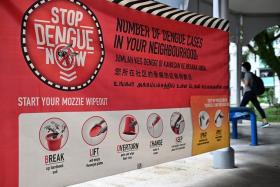Dengue cases in Singapore up 36% from 2023
There were more than 13,600 cases of dengue locally in 2024, an increase of over 36 per cent from the year before.
According to the latest statistics on the National Environmental Agency’s (NEA) website, there were 9,949 cases in 2023.
Though there was an increase in dengue cases, NEA said Project Wolbachia, along with “strong and sustained community vigilance” against breeding, likely helped to prevent large outbreak clusters. The midyear surge in dengue cases was also “largely subdued”.
“This was despite a high baseline of dengue cases, low population immunity, and higher mosquito population in some areas,” said the agency.
Project Wolbachia began in 2016, and is named after the Wolbachia bacteria introduced to male mosquitoes in the lab. When female mosquitoes in the environment mate with these mosquitoes, their eggs do not hatch.
Hence, the release of the male mosquitoes in high-risk dengue areas can reduce the mosquito population over time.
There were 110 dengue cases reported between Dec 29, 2024, and Jan 4, 2025 – 39 cases more than in the previous week.
As at Jan 6, there are 14 active dengue clusters, of which three have been classified as high-risk areas with 10 or more cases.
These areas are in Bedok, Sixth Avenue and Ang Mo Kio.
“Among the four dengue virus serotypes circulating in Singapore, dengue virus serotype 2 (DenV-2) has been predominant since September 2023, with prior periodic dominance of DenV-1 and DenV-3 in 2023,” said the agency.
“Our population’s immunity to all four dengue virus serotypes remains low. The continued presence of all these dengue risk factors may lead to a potential surge in dengue cases, if insufficient action is taken.”
The most likely reason for the spike in dengue cases in 2024 is the change in predominant dengue virus serotype, said Professor Paul Tambyah, immediate past president of the International Society for Infectious Diseases.
“Almost every time there is a serotype switch, there will be a large proportion of the population who are not immune to the circulating strain, and hence (this leads to) more symptomatic infections,” Prof Tambyah told The Straits Times.
“2024 was also one of the hottest years on record, and hot and wet conditions are likely to have contributed to increased mosquito biting activity, although it is hard to prove.”
NEA urged members of the public to remove stagnant water from their environment and maintain good housekeeping to prevent the formation of any potential breeding spots.
Get The New Paper on your phone with the free TNP app. Download from the Apple App Store or Google Play Store now

